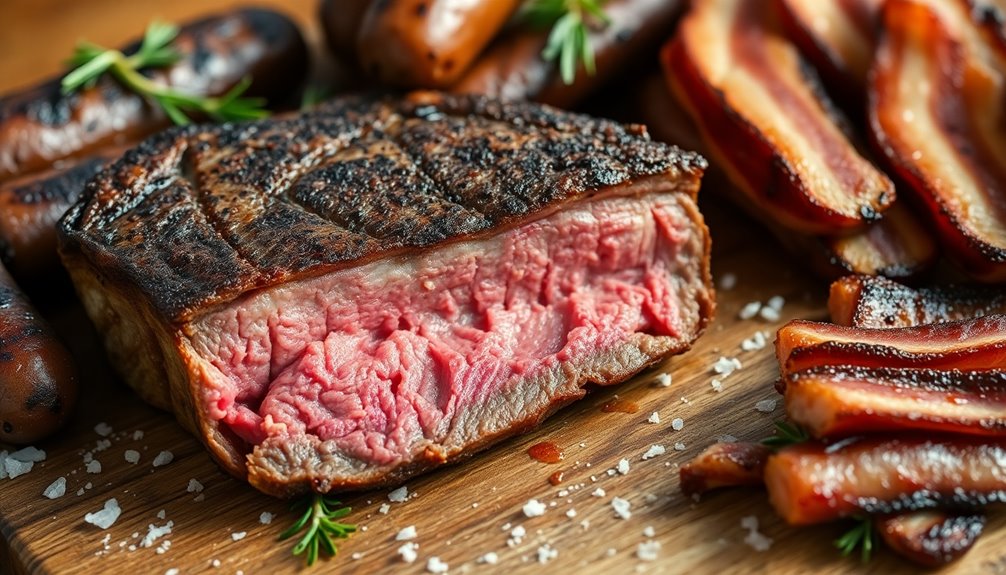The Carnivore Diet focuses exclusively on animal products, cutting out all plant-based foods. This approach emphasizes high-quality meats for their health benefits and claims to align with human evolutionary patterns. While you can see improvements in various health markers, be aware of potential nutrient deficiencies, like vitamin C and E. You'll face challenges, especially with cravings and social situations. Meal planning and preparation can help you stay on track. If you're curious about how it compares to other diets or want tips for starting, there's plenty more to explore!
Key Takeaways
- The Carnivore Diet consists solely of animal products, excluding all plant-based foods for a high-protein intake.
- It may lead to potential deficiencies in vitamins C and E, as well as essential minerals like magnesium and potassium.
- Emphasis on high-quality, grass-fed, or pasture-raised animal products supports healthy fats and nutritional balance.
- The diet shares similarities with ketogenic diets due to its low carbohydrate focus but strictly avoids all plant foods.
- Personal experiences often highlight significant health improvements, though long-term sustainability and ethical considerations are important factors to assess.
What Is the Carnivore Diet?
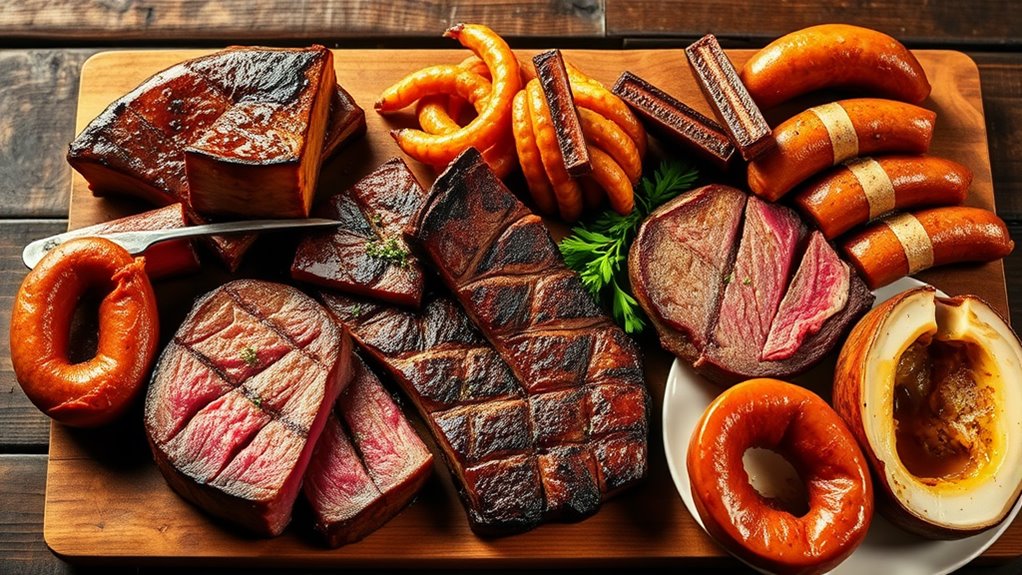
The Carnivore Diet is primarily focused on consuming animal products while excluding all plant-based foods. You might find this approach appealing if you're looking to connect with others who share similar dietary beliefs. At its core, this diet emphasizes meat consumption, which many argue aligns with human evolution.
From an evolutionary perspective, our ancestors thrived on diets rich in animal proteins and fats, which helped shape our physical and biological makeup. Studies suggest that a protein-rich diet can support significant improvements in health markers, including weight loss and muscle recovery.
By embracing the Carnivore Diet, you're not just choosing a way to eat; you're joining a community that values this ancestral wisdom. Many followers believe that by reverting to a meat-based diet, they can improve health markers and overall well-being. You'll often hear stories of individuals who've experienced significant transformations, from weight loss to increased energy levels, all while bonding with like-minded folks who understand the journey.
This diet also encourages you to explore various animal products, from different cuts of meat to organ meats, enriching your culinary experience. As you dive deeper, you may develop a sense of pride in crafting meals that honor your body's natural needs.
In a world filled with dietary confusion, the Carnivore Diet offers a clear and straightforward path. It invites you to embrace a lifestyle that resonates with your desire for community and belonging while celebrating the benefits of meat consumption rooted in our evolutionary history.
Key Principles of the Diet
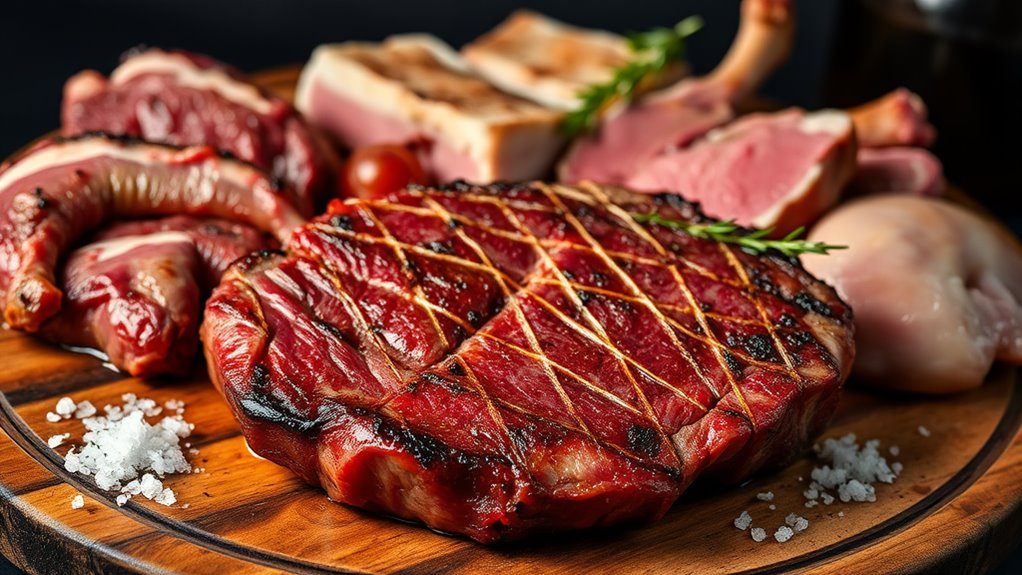
Adopting the Carnivore Diet means embracing several key principles that guide your food choices and lifestyle. At its core, this diet focuses on consuming animal products exclusively, which means you'll be prioritizing protein sources like beef, pork, poultry, and fish. By centering your meals around these foods, you'll find a sense of simplicity and satisfaction in your eating habits.
Understanding various cooking methods is essential for making the most of your protein sources. Whether you prefer grilling, roasting, or slow-cooking, each method can enhance the flavors and textures of the meats you enjoy. Experimenting with different techniques will not only keep your meals exciting but also help you discover what works best for your palate.
Here's a quick overview of some key principles to keep in mind:
| Principle | Description |
|---|---|
| Protein Sources | Focus on high-quality animal products. |
| Cooking Methods | Use techniques that highlight natural flavors. |
| Meal Planning | Prepare meals in advance for ease and variety. |
| Hydration | Stay hydrated, focusing on water and broth. |
| Mindfulness | Be aware of how your body feels with each meal. |
In contrast to the Carnivore Diet, a plant-based diet offers a variety of health benefits, including lower cholesterol levels and enhanced heart health.
Potential Health Benefits
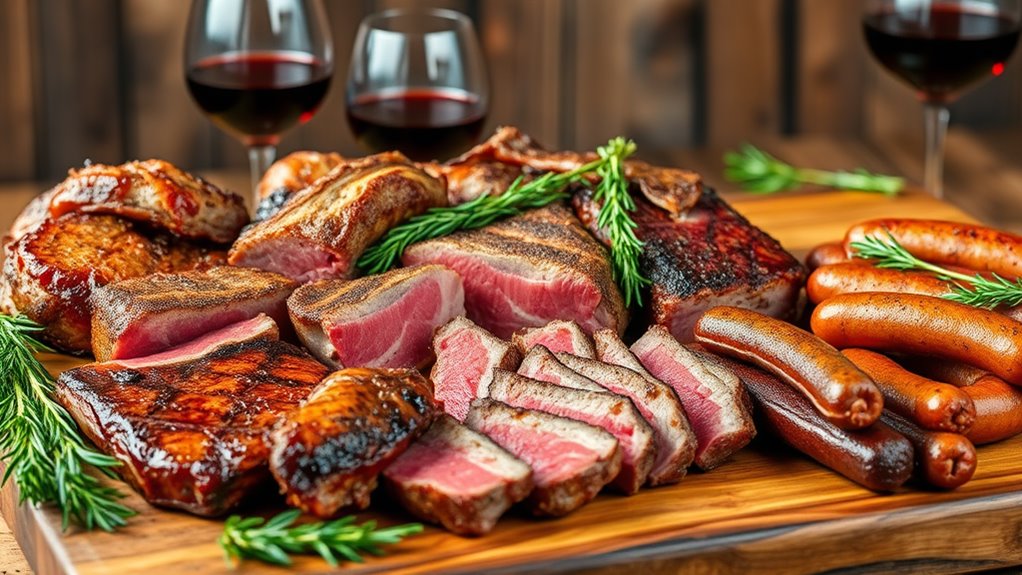
Many followers of the Carnivore Diet report a range of potential health benefits that stem from eliminating plant-based foods and focusing solely on animal products. You might find that these changes lead to significant weight loss, as many people experience reduced cravings and a natural decrease in caloric intake. By prioritizing protein and fat, you may feel satisfied longer, making it easier to stick to your dietary goals.
Improved digestion is another advantage many people notice. With a diet free from fiber and complex carbohydrates, you might experience less bloating and discomfort. This simplicity can help your digestive system function more smoothly, allowing you to enjoy meals without the aftermath of digestive distress.
When it comes to mental clarity, many followers rave about enhanced focus and cognitive function. You could find that your mind feels sharper, as the absence of sugar crashes and processed foods allows for steadier energy levels. This increased mental clarity can empower you to tackle daily tasks with a renewed sense of purpose.
Furthermore, countless individuals report increased energy levels while on the Carnivore Diet. By fueling your body primarily with animal products, you might experience a more sustained energy supply, making it easier to engage in physical activities or simply get through your day without feeling fatigued.
In essence, the Carnivore Diet might offer you a sense of energy and well-being that fosters connection with others who share similar experiences and goals. Additionally, many individuals find that adopting a plant-based diet can lead to a longer lifespan, highlighting the various dietary lifestyles available.
Nutritional Considerations
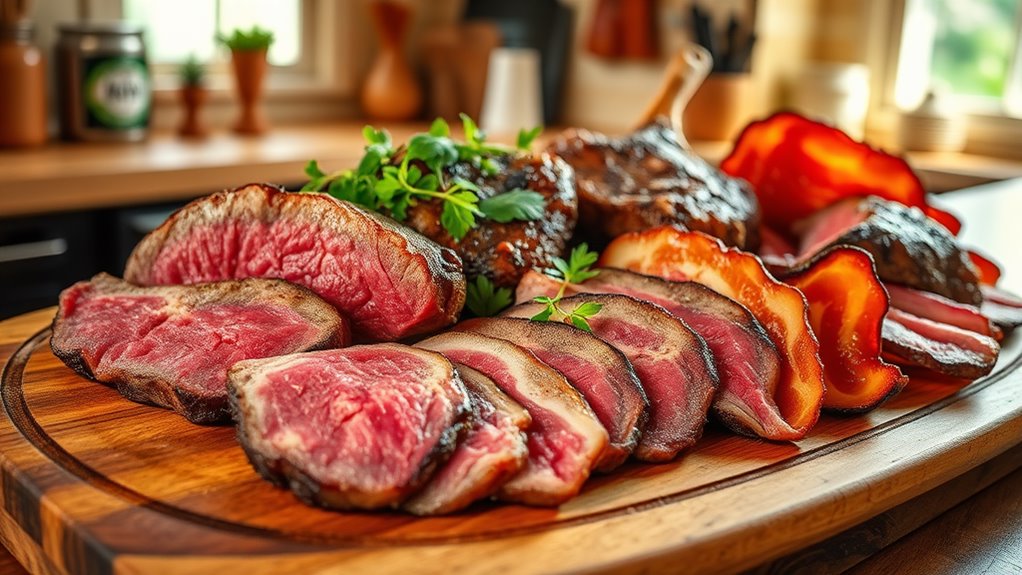
When pondering the Carnivore Diet, it's crucial to grasp its nutritional implications. This diet mainly consists of animal products, which means your protein intake can be notably higher than in more traditional diets. While protein is crucial for muscle repair and overall health, you need to make sure you're meeting your body's diverse nutritional needs.
Here are a few key nutritional aspects to keep in mind:
- Protein Intake: While increased protein might support muscle growth, excessive amounts can strain your kidneys and affect your hydration levels.
- Vitamin Deficiencies: A strict carnivore diet can lead to potential deficiencies in vitamins like C and E, which are typically found in fruits and vegetables. You might want to ponder how to mitigate this risk.
- Mineral Balance: Your diet may lack essential minerals like magnesium and potassium, which are crucial for muscle function and heart health.
- Fat Quality: The type of fat you consume matters. Focus on healthy fats from grass-fed or pasture-raised animals to support overall well-being. Additionally, considering the health benefits of ketogenic diets can provide insights on how to ensure a well-rounded approach to your nutritional needs.
Joining the carnivore community can be rewarding, but it's essential to be aware of these nutritional factors. By being mindful of your protein intake and keeping an eye on potential vitamin deficiencies, you can better navigate this unique dietary approach. Remember, it's all about finding what works for you and staying connected with others who share similar goals!
Common Challenges Faced
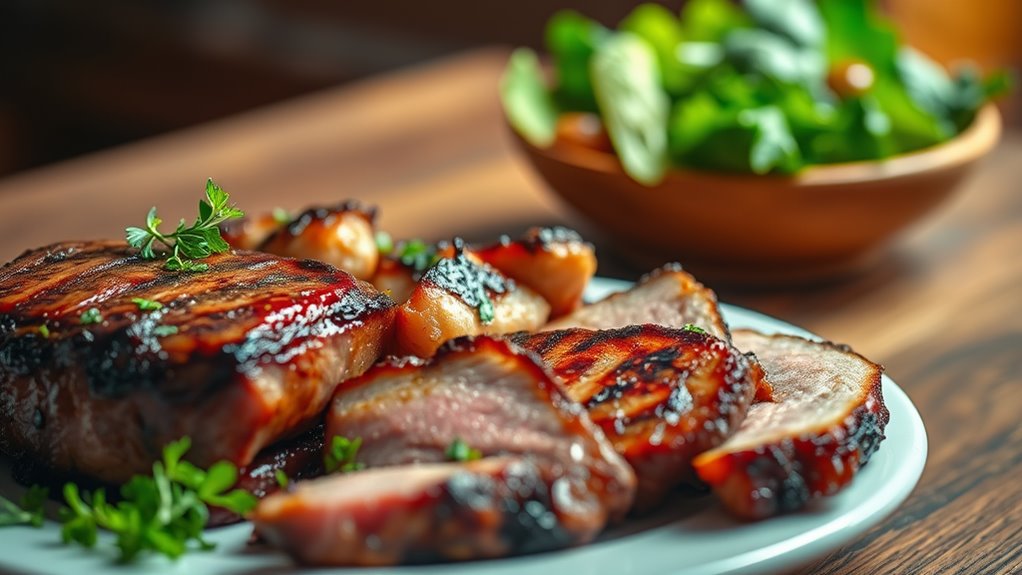
Shifting to the Carnivore Diet can present several common challenges that might catch you off guard. One of the most significant hurdles you might face is handling social situations. Whether it's a family gathering or a night out with friends, the limited food options can make you feel isolated or pressured to indulge in non-carnivore foods. It's crucial to communicate your dietary choices to your loved ones so they can support you and perhaps even accommodate your needs.
Cravings are another challenge that can arise, especially in the initial stages. You might find yourself longing for carbs or processed snacks that you used to enjoy. Understanding that these cravings are part of the adjustment can help you push through. Staying focused on your goals and reminding yourself of the benefits may just help you resist temptation.
Meal planning is vital when you're on the Carnivore Diet. You'll need to strategize and prepare your meals in advance to avoid falling back into old eating habits. Creating a routine can make things easier and more enjoyable, allowing you to explore different cuts of meat and cooking methods.
Lastly, some people experience digestive issues during the transition. It's not uncommon to face adjustments in your gut health as your body adapts to this new way of eating. Drinking enough water and considering electrolytes can help ease discomfort. Additionally, understanding the importance of nutritional balance can further enhance your experience on the diet. Remember, you're not alone in these challenges; many others are embarking on the same journey alongside you.
Comparing With Other Diets
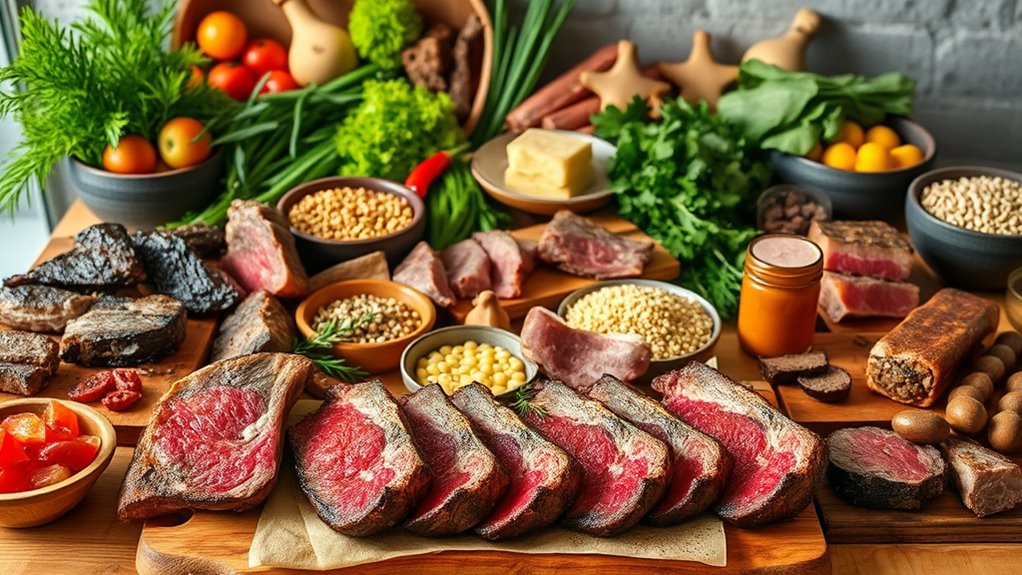
Often overlooked, the Carnivore Diet stands out among other popular dietary approaches due to its strict focus on animal products. If you're considering this diet, it's helpful to compare it with others to understand its unique position.
- Keto Comparison: While both diets emphasize low carbohydrate intake, the Carnivore Diet takes it a step further by eliminating all plant foods. Many people find the high fat and protein ratio in the Carnivore Diet satiating, whereas Keto allows for some carbs.
- Plant-Based Contrast: Unlike plant-based diets, which promote fruits, vegetables, and grains, the Carnivore Diet strictly limits you to meat, fish, and animal products. This can be a significant shift for those accustomed to a more diverse diet.
- Flexibility: The Carnivore Diet is often seen as less flexible than diets like Keto or Mediterranean. With the latter, you can still enjoy a variety of foods, which some find more socially accommodating.
- Nutrient Focus: Advocates of the Carnivore Diet argue that it can deliver essential nutrients more efficiently through animal sources, while plant-based diets often require careful planning to meet nutritional needs. Additionally, the Carnivore Diet may help reduce the risk of diseases linked to wheat consumption and its inflammatory effects.
Understanding these comparisons can help you make an informed decision about whether the Carnivore Diet aligns with your health goals and lifestyle. It's about finding what works for you and your community, so don't hesitate to explore and connect with others on this journey.
Tips for Getting Started
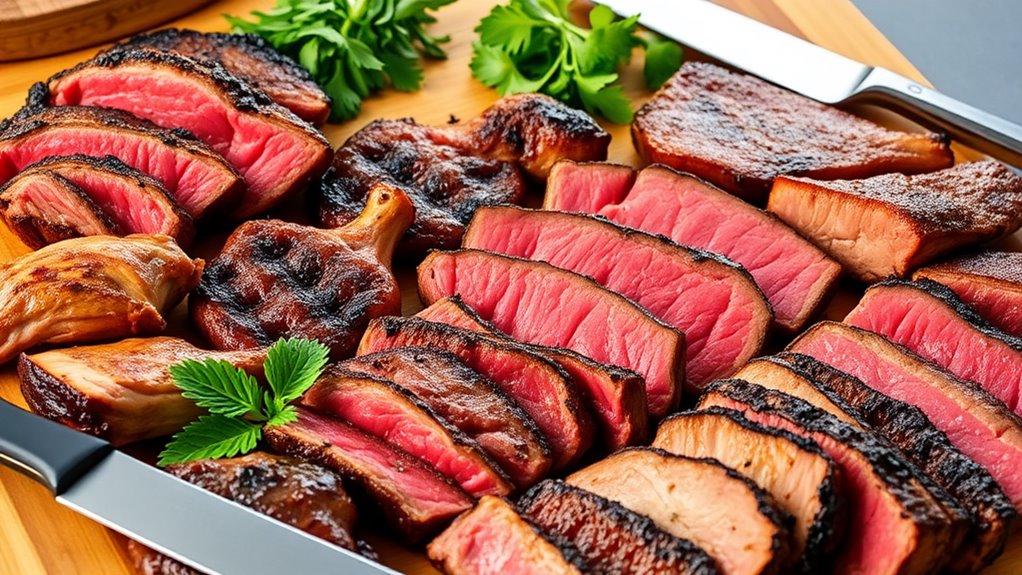
Beginning on the Carnivore Diet can be a transformative experience, but it requires thoughtful planning and dedication. To help you get started, consider focusing on meal planning and grocery shopping. These two components will set you up for success and help you feel confident in your new lifestyle.
First, take some time to strategize your meals for the week. Ponder the types of meat you enjoy and the various ways you can cook them. You might experiment with grilling, roasting, or slow-cooking to keep things interesting.
Don't hesitate to try out different cuts of meat, organ meats, and even bone broth to guarantee you're receiving a variety of nutrients.
Once you've mapped out your meal plan, it's time for grocery shopping. Develop a list based on your planned meals to avoid impulse purchases that deviate from the diet. Concentrate on obtaining high-quality meats from local farmers or reputable butchers if possible.
Seek out grass-fed beef, free-range poultry, and wild-caught fish to improve the quality of your meals. Additionally, be mindful of the importance of high-quality meats to ensure you're nourishing your body effectively.
Also, consider stocking up on pantry essentials like salt and spices to enhance the flavors of your dishes. As you set out on this journey, remember that community support can make a difference. Connect with others on the same path through online forums or local groups.
Sharing experiences and tips can help you feel less isolated and more empowered in your choices. You're not alone in this; many are on the same journey alongside you!
Long-term Sustainability
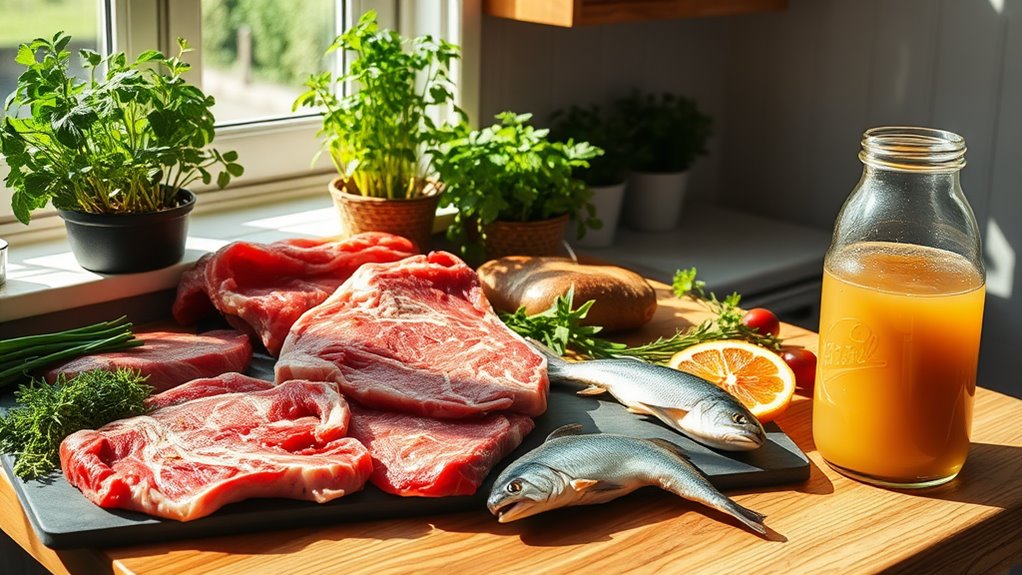
Embracing the Carnivore Diet for the long haul requires careful consideration of your lifestyle and nutritional needs. While this diet offers many benefits, it's important to reflect on its long-term sustainability. You want to make sure that your choices align with your values and those of the community around you.
Here are four key aspects to think about:
- Environmental Impact: The Carnivore Diet can raise concerns about livestock farming's ecological footprint. It's vital to source your meats from sustainable and ethical farms that prioritize animal welfare and environmental stewardship.
- Ethical Concerns: Consider your personal beliefs about animal rights and welfare. Engaging with local farmers or producers can help you make informed choices and minimize ethical dilemmas.
- Social Implications: Being part of a community is crucial for your well-being. The Carnivore Diet might make social gatherings tricky. Think about how you can navigate these situations while maintaining your dietary preferences and fostering connections.
- Cultural Acceptance: Different cultures have diverse dietary practices. It's important to recognize how the Carnivore Diet fits within broader cultural contexts and to respect these variations while sharing your journey. Additionally, consider how your dietary choices might impact your overall health and well-being, similar to the weight loss benefits highlighted in structured diet programs like The Smoothie Diet.
Personal Experiences and Testimonials

Many who've adopted the Carnivore Diet share transformative stories that highlight its effects on health and well-being. You might find inspiration in these success stories, as many people have experienced remarkable improvements in energy levels, mental clarity, and even weight loss. It's not just about the food; it's about a lifestyle shift that brings people together, fostering a sense of community among those who embrace this way of eating.
As you consider making dietary adjustments, it's crucial to prepare for the adaptation period. Many newcomers report a range of feelings as their bodies adjust to a meat-based diet. While some experience a bit of discomfort initially, such as fatigue or cravings for carbs, these challenges often pass within a few weeks.
You'll soon hear about those who pushed through and found themselves enjoying newfound strength, free from bloating and digestive issues.
For many, the transformation isn't just physical; it's emotional and mental too. They often speak of feeling more in control of their health and choices. You'll likely resonate with the stories of camaraderie, where people bond over shared meals and support each other in their journeys.
Interestingly, many who have improved their health through dietary changes, such as the Carnivore Diet, have also reported better liver function, which is essential for overall well-being and metabolic health.
If you're curious about the Carnivore Diet, remember you're not alone. The experiences shared by others can pave the way for your own success story, fueling your motivation to embrace this unique and rewarding lifestyle.
Frequently Asked Questions
Can I Drink Coffee or Tea on the Carnivore Diet?
You might wonder if you can drink coffee or tea while following a specific diet. Caffeine consumption can be a personal choice, but it's important to think about how it affects your body.
Staying hydrated is vital, so balance your caffeine intake with plenty of water. If you enjoy coffee or tea, just be aware of how they fit into your overall hydration strategies.
It's all about finding what works best for you!
Is the Carnivore Diet Suitable for Children?
When considering whether a diet's suitable for children, addressing nutritional concerns is important. Kids need a balanced intake to support their growth and development.
While some adults thrive on restrictive diets, children may require a variety of foods to make sure they get all the vitamins and minerals they need.
It's important to consult with a pediatrician or a nutritionist to make sure your child's dietary choices promote healthy growth and overall well-being.
What Should I Do if I Crave Carbohydrates?
When those carb cravings hit, it's totally normal to wonder why. Your body might be seeking quick energy or comfort. To manage cravings, explore delicious carb substitutes like cauliflower rice or zucchini noodles. These can satisfy your hunger while keeping things on track. Get creative in the kitchen!
How Does the Carnivore Diet Affect Athletic Performance?
When you switch to a high-protein diet, you might notice changes in your athletic performance. Many find that muscle recovery improves, helping you bounce back faster after workouts. However, you could experience fluctuating energy levels, which might impact your endurance during longer sessions.
While some report enhanced strength, others may struggle with stamina. Pay attention to your body and adjust your nutrition to find what works best for your performance goals.
Are There Any Specific Foods to Avoid on the Carnivore Diet?
In today's world, avoiding junk food's like dodging a bullet!
On the carnivore diet, you should steer clear of processed meats, which can lead to nutrient deficiencies and digestive issues.
Remember, it's all about quality. Stick to fresh, whole cuts of meat and limit anything with additives or preservatives.
You'll feel better, and your body will thank you for it.
Embracing this lifestyle can truly make you feel part of a vibrant community!
Conclusion
Ultimately, the carnivore diet offers a unique approach to nutrition, focusing solely on animal products. While you might wonder if such a restrictive diet could truly meet all your health needs, many find it simplifies meal planning and boosts energy. As you consider making this dietary shift, remember to weigh the potential benefits against the challenges. Ultimately, it's about what works best for your body and lifestyle—are you ready to embrace this meaty journey?

